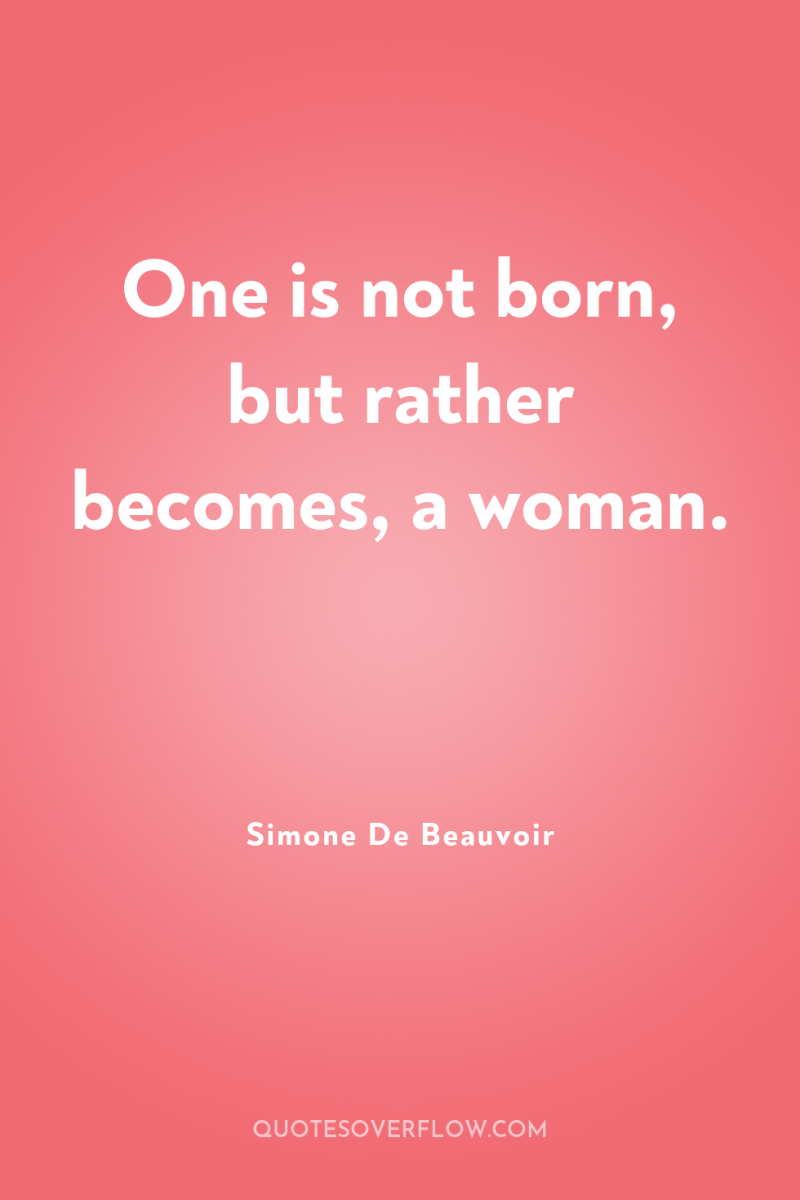1
Two separate beings, in different circumstances, face to face in freedom and seeking justification of their existence through one another, will always live an adventure full of risk and promise." (p. 248)Simone De Beauvoir

2
One is not born, but rather becomes, a woman.Simone De Beauvoir
3
In particular those who are condemned to stagnation are often pronounced happy on the pretext that happiness consists in being at rest. This notion we reject, for our perspective is that of existentialist ethics. Every subject plays his part as such specifically through exploits or projects that serve as a mode of transcendence; he achieves liberty only through a continual reaching out towards other liberties. There is no justification for present existence other than its expansion into an indefinitely open future. Every time transcendence falls back into immanence, stagnation, there is a degradation of existence into the ‘en-sois’ — the brutish life of subjection to given conditions — and of liberty into constraint and contingence. This downfall represents a moral fault if the subject consents to it; if it is inflicted upon him, it spells frustration and oppression. In both cases it is an absolute evil. Every individual concerned to justify his existence feels that his existence involves an undefined need to transcend himself, to engage in freely chosen projects.Simone De Beauvoir
4
Capabilities are clearly manifested only when they have been realized.Simone De Beauvoir

5
Authentic love must be founded on reciprocal recognition of two freedoms...Simone De Beauvoir
6
Art, literature, and philosophy are attempts to found the world anew on a human freedom: that of the creator; to foster such an aim, one must first unequivocally posit oneself as a freedom. The restrictions that education and custom impose on a woman limit her grasp of the universe.. Indeed, for one to become a creator, it is not enough to be cultivated, that is, to make going to shows and meeting people part of one's life; culture must be apprehended through the free movement of a transcendence; the spirit with all its riches must project itself in an empty sky that is its to fill; but if a thousand fine bonds tie it to the earth, its surge is broken. The girl today can certainly go out alone, stroll in the Tuileries; but I have already said how hostile the street is: eyes everywhere, hands waiting: if she wanders absentmindedly, her thoughts elsewhere, if she lights a cigarette in a cafe, if she goes to the cinema alone, an unpleasant incident can quickly occur; she must inspire respect by the way she dresses and behaves: this concern rivets her to the ground and self. "Her wings are clipped." At eighteen, T.E. Lawrence went on a grand tour through France by bicycle; a young girl would never be permitted to take on such an adventure.. Yet such experiences have an inestimable impact: this is how an individual in the headiness of freedom and discovery learns to look at the entire world as his fief..[ The girl] may feel alone within the world: she never stands up in front of it, unique and sovereign. .Simone De Beauvoir

7
(…) symbolism did not fall out of heaven or rise out of subterranean depths: it was elaborated like language, by the human reality…Simone De Beauvoir
8
The younger and healthier a woman is and the more her new and glossy body seems destined for eternal freshness, the less useful is artifice; but the carnal weakness of this prey that man takes and its ominous deterioration always have to be hidden from him.. In any case, the more traits and proportions of a woman seem contrived, the more she delighted the heart of man because she seemed to escape the metamorphosis of natural things. The result is this strange paradox that by desiring to grasp nature, but transfigured, in woman, man destines her to artifice.Simone De Beauvoir
9
No one is more arrogant toward women, more aggressive or scornful, than the man who is anxious about his virility.Simone De Beauvoir
10
...her wings are cut and then she is blamed for not knowing how to fly.Simone De Beauvoir
11
Woman has ovaries and a uterus; such are the particular conditions that lock her in her subjectivity; some even say she thinks with her hormones. Man vainly forgets that his anatomy also contains hormones and testicles. He grasps his body as a direct and normal link with the world that he believes he apprehends in all objectivity, whereas he considers woman's body an obstacle, a prison, burdened by everything that particularizes it.Simone De Beauvoir
12
The fact is that men encounter more complicity in their woman companions than the oppressor usually finds in the oppressed; and in bad faith they use it as a pretext to declare that woman wanted the destiny they imposed on her. We have seen that in reality her whole education conspires to bar her from paths of revolt and adventure; all of society - beginning with her respected parents - lies to her in extolling the high value of love, devotion, and the gift of self and in concealing the fact that neither lover, husband nor children will be disposed to bear the burdensome responsibility of it. She cheerfully accepts these lies because they invite her to take the easy slope: and that is the worst of the crimes committed against her; from her childhood and throughout her life, she is spoiled, she is corrupted by the fact that this resignation, tempting to any existent anxious about her freedom, is mean to be her vocation; if one encourages a child to be lazy by entertaining him all day, without giving him the occasion to study, without showing him its value, no one will say when he reaches the age of man that he chose to be incapable and ignorant; this is how the woman is raised, without ever being taught the necessity of assuming her own existence; she readily lets herself count on the protection, love, help and guidance of others; she lets herself be fascinated by the hope of being able to realise her being without doing anything. She is wrong to yield to this temptation; but the man is ill advised to reproach her for it since it is he himself who tempted her. .Simone De Beauvoir
13
How could women ever have had genius when all possibility of accomplishing a work of genius - or just a work - was refused them?Simone De Beauvoir
14
How could van Gogh have been born woman? A woman would not have been sent on mission to Boringe, she would not have felt men's misery as her own crime, she would not have sought redemption; so she would never have painted van Gogh's sunflowers. And this without taking into account that the painter's kind of life - the solitude in Arles, going to cafés, whorehouses, everything that feed into van Gogh's art by feeding his sensibility - would have been prohibited to her. A woman could never have become Kafka: in her doubts and anxieties, she would never have recognised the anguish of Man driven from paradise.Simone De Beauvoir
15
In truth, to go for a walk with one's eyes open is enough to demonstrate that humanity is divided into two classes of individuals whose clothes, faces, bodies, smiles, gaits, interests, and occupations are manifestly different. Perhaps these differences are superficial, perhaps they are destined to disappear. What is certain is that right now they do most obviously exist.Simone De Beauvoir
16
The feminine body is expected to be flesh, but discreetly so;Simone De Beauvoir
17
If so few female geniuses are found in history, it is because society denies them any means of expression.Simone De Beauvoir
18
The relation of woman to husband, of of daughter to father, of sister to brother, is a relation of vassalage.Simone De Beauvoir
19
She gives birth in pain, she heals males' wounds, she nurses the newborn and buries the dead; of man she knows all that offends his pride and humiliates his will. While inclining before him and submitting flesh to spirit, she remains on the carnal borders of the spirit; and she contests the sharpness of hard masculine architecture by softening the angles; she introduces free luxury and unforeseen grace.Simone De Beauvoir
20
; the man who does not "understand" a woman is happy to replace his subjective deficiency with an objective resistance; instead of admitting his ignorance, he recognizes the presence of a mystery exterior to himself: here is an excuse that flatters his laziness and vanity at the same time.Simone De Beauvoir
21
The relation of woman to husband, of daughter to father, of sister to brother, is a relation of vassalage.Simone De Beauvoir
22
Taking without being taken in the anguish of becoming prey is the dangerous game of adolescent feminine sexuality.Simone De Beauvoir
23
The little girl feels that her body is escaping her, that it is no longer the clear expression of her individuality: it becomes foreign to her; and at the same moment she is grasped by others as a thing: on the street, eyes follow her, her body is subject to comments; she would like to become invisible; she is afraid of becoming flesh and afraid to show her flesh.Simone De Beauvoir
24
: woman is an eminently poetic reality since man projects onto her everything he is not resolved to be.Simone De Beauvoir
25
One understands now the drama that rends the adolescent girl at puberty: she cannot become “a grown-up” without accepting her femininitySimone De Beauvoir
26
[Woman] is simply what man decrees; thus she is called "the sex, " by which is meant that she appears essentially to the male as a sexual being. For him she is sex -- absolute sex, no less. She is defined and differentiated with reference to man and not he with reference to her; she is incidental, the inessential as opposed to the essential. He is the Subject, he is the Absolute -- she is the Other. .Simone De Beauvoir
27
We will not let ourselves be intimidated by the number and violence of attacks against women; nor be fooled by the self-serving praise showered on the “real woman”; nor be won over by men’s enthusiasm for her destiny, a destiny they would not for the world want to share.Simone De Beauvoir
28
A woman's situation, i.e those meanings derived from the total context in which she comes to maturity, disposes her to apprehend her body not as instrument of her transcendence, but "an object destined for another.Simone De Beauvoir
29
One is not born, but rather becomes a woman.Simone De Beauvoir
30
In oppressing, one becomes oppressed. Men are enchained by reason of their very sovereignty; it is because they alone earn money that their wives demand checks, it is because they alone engage in a business or profession that their wives require them to be successful, it is because they alone embody transcendence that their wives wish to rob them of it by taking charge...Simone De Beauvoir
31
Weakness' is weakness only in light of the aims man sets for himself, the instruments at his disposal and the laws he imposes.Simone De Beauvoir